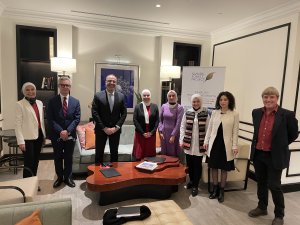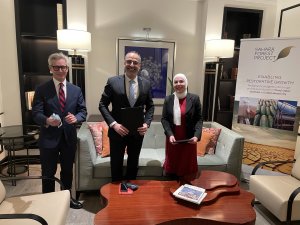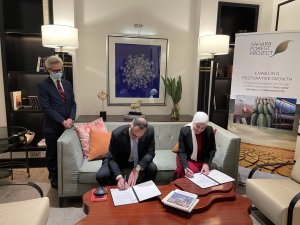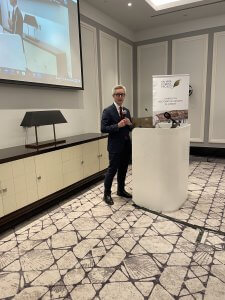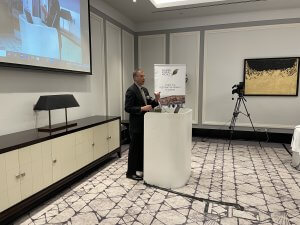-Moving one step closer to green growth in the Kingdom of Jordan-
AMMAN – The Sahara Forest Project (SFP) held a National Stakeholders Roundtable in Amman on Tuesday on how to enable green growth in Jordan through new partnerships. Together with academic and industry partners, diplomats and other stakeholders, new cooperations between SFP and Jordanian universities are now launched. The project’s three pillars focus on large-scale development of the Sahara forest project farm in Aqaba, the SHE GROWS initiative for training of young professional females in climate smart agriculture, and to ultimately develop a green tech and innovative hub in Aqaba for climate smart agriculture.
The roundtable was kicked off by notes from the Norwegian Ambassador to Amman, Espen Lindbæck, who highlighted that “SFP presents yet another example of the deep cooperation between Jordan and Norway to face climate challenges that are not only facing the Kingdom but the entire world.”
Mohammad Al-Sakran, Executive Director of Transport and Logistics at the Aqaba Development Corporation (ADC) announced the much-anticipated water pipe to be extended from the red sea to the project’s site in Aqaba. This will enable SFP to grow in scale and operations to reach commercial levels, and use arid lands, solar energy, and seawater to produce fresh and high quality vegetables.
“We have been working with our partners on the Sahara Forest Project since 2010. One of the most important things is that it is environmental friendly, and that it utilizes renewable energy as the core of the project,” said Sakran
On the sidelines of the event, SFP signed multiple agreements with Hussein Technical University (HTU) and Aqaba University of Technology as part of the SHE GROWS technical training program provided to female students.
The program aims to enable female university students to better understand and apply the latest technology in sustainable agriculture. During the pilot phase of the SHE GROWS program that took place between October 2020 – October 2021, 30 female Engineers were targeted through the partnership between Al Hussein Technical University and the SFP in Aqaba. The program intended to increase employment opportunities for the participants by focusing on the skills required in the labor market, such as specialized technical skills in the areas of climate smart agriculture, English language, research, technical writing, and presentation/communication skills.
Ruba Al-Zubi, SFP’s Country Director, underlined the importance of the event and lauded Jordan’s commitment to SFP.
“We are very proud at the Sahara Forest Project that the upskilling program implemented as part of our She Grows strategic pillar is gaining momentum and is being institutionalized by local partners. The leadership from Al Hussein Technical University team and the interest from several other actors is key for making a sustainable impact. Today we celebrate – with our strategic partner (HTU) – the launch of another Cohort that would include 20 Jordanian females passionate to develop their skills in the agritech sector. This agreement is very special as it sets a mutual goal for ensuring more applications are submitted by Jordanian young females from Aqaba and the Southern parts of Jordan. Moreover, a trilateral MoU is signed whereby SFP, HTU, Aqaba University of Technology (AUT) jointly commit to collaborate on various aspects including the upskilling program, applied research, and awareness raising within the context of agritech and climate smart food production. “said Al-Zubi.
President of Aqaba University of Technology, Mohammad Abu-Darweesh said “this memorandum of understanding comes in line with a joint vision with SFP and HTU aiming to provide training opportunities for young women and youth to help them unleash the opportunities in smart and sustainable agriculture which is driving the Kingdom towards achieving food security and boosting green economy while driving us closer to sustainable development which encompasses the individual, community, and the environment. This partnership also cements the role of Jordanian universities as a collective mechanism to build capacity to serve society and humanity.”
The President of Al Hussein Technical University, Ismael Al-Hinti, emphasized that, “our partnership with SFP builds on our previous cooperation and our efforts to contribute to the readiness of our youth to enter the job market. This program is not limited to building technical capacity but exceeds it to include life skills and English language skills.
We are optimistic in the next phase which will include the training of 20 additional female students in the agriculture sector, as we believe that more partnerships will enrich this program.”
Hiba Al-Momani, a graduate of the second co-hort and founder of eco-use expressed how empowering the program was. “You don’t believe how this program has built us step by step. They empowered us. This is different than other universities that give us an education, it’s both technical and practical. Eco-use Jordan is a small non profit that focuses in sustainability, and my team is fully female and they hold the same message to teach communities, how we can help the environment. We focus on country sides and local communities and teach them how they can Make a real impact.” Said Al-momani.
The event also featured keynotes from environmental experts, most notably Professor Dan Kammen. Kammen was the former US Science envoy during president Obama’s term ,and one of the Lead Authors on the IPCC report in 2007 who won the Nobel Peace Prize, and is currently sharing his time between USAID and being Director of Renewable and Appropriate Energy Laboratory University of California Berkeley.
“This idea of moving from a world where fossil fuels were cheaper than renewable energy to the new world we’re in, where renewable energy is cheaper than fossil fuels, for many of us felt like the mission. But as we get closer and closer, now we have seen that basically everywhere, clean energy is cheaper than dirty energy.
“So the idea that looking at this food-energy-water nexus, is precisely the point of getting to a clean energy world. Replacing fossil fuels with green energy is great but that does nothing if we don’t also shift the gender inequalities, the social inequalities, and the under emphasis on food for people who don’t have today,” said Kammen.
Professor Kammen emphasized the need for bankable, pro-green, pro-energy, and pro-agricultural projects highlighting that clean energy is only the starting point, not the goal for what is needed to turn the global economy green.
“As sustainable agriculture goes here, so does the story in much of the Middle East. So it’s critical locally, and it’s critical to spread the model. I want to highlight with my USAID hat, that this is the Jordan prototype of the Sahara forest project and I am looking forward eagerly to seeing projects in Egypt in Tunisia, in Mauritania, in Senegal, and in many other places where this technological model is the start but it’s the human capacity building it. It’s why having female engineers up front in the story is so critical.” said Kammen
Bellona President and Founder, acclaimed environmentalist Frederic Hauge, attended the event online. Hauge underlined the importance of utilizing biomass, and other elements to achieve sustainable green growth and face challenges imposed by climate change.
“Bellona has for several years been advocating for the great importance of producing biomass as a crucial tool in the global fight against climate change. Bellona is proud to partner with Sahara Forest Project to develop concrete solutions in Jordan together with Norwegian and international partners at the Sahara Forest Project Launch Station in Aqaba. The goal is to make a scalable concept where we turn waste streams into resources in combination with desalinated seawater and solar power,” said Hauge.
SFP facility in Aqaba Jordan was inaugurated by HM King Abdullah II and HRH Crown Prince Haakon of Norway in 2017, following 3-year trial period. The project is ready for commercial scale-up for production both for the export of vegetables to Europe and for the domestic vegetable market in Amman to replace the import of vegetables from Europe with vegetables produced at the SFP facility in Aqaba.